Research Translation: Telecommuting's Psychological Impact Analysis
VerifiedAdded on 2022/08/17
|6
|1171
|27
Report
AI Summary
This research translation delves into the meta-analysis by Ravi S. Gajendran and David A. Harrison regarding the impacts of telecommuting. It addresses the inconsistencies in previous research by expanding the definition of telecommuting and examining its effects on employees and organizations. The study uses a meta-analytical approach, evaluating 46 previous studies to assess the positive and negative consequences of telecommuting and the psychological factors mediating these effects. Key findings indicate that telecommuting generally has beneficial effects on autonomy, work-family conflict, job satisfaction, and performance. However, it also highlights potential drawbacks such as strained relationships with supervisors and career stagnation due to lack of visibility. The research emphasizes the importance of considering gender and individual circumstances in telecommuting arrangements and acknowledges limitations related to the evolving nature of telecommuting and the potential for increased organizational control through technology.
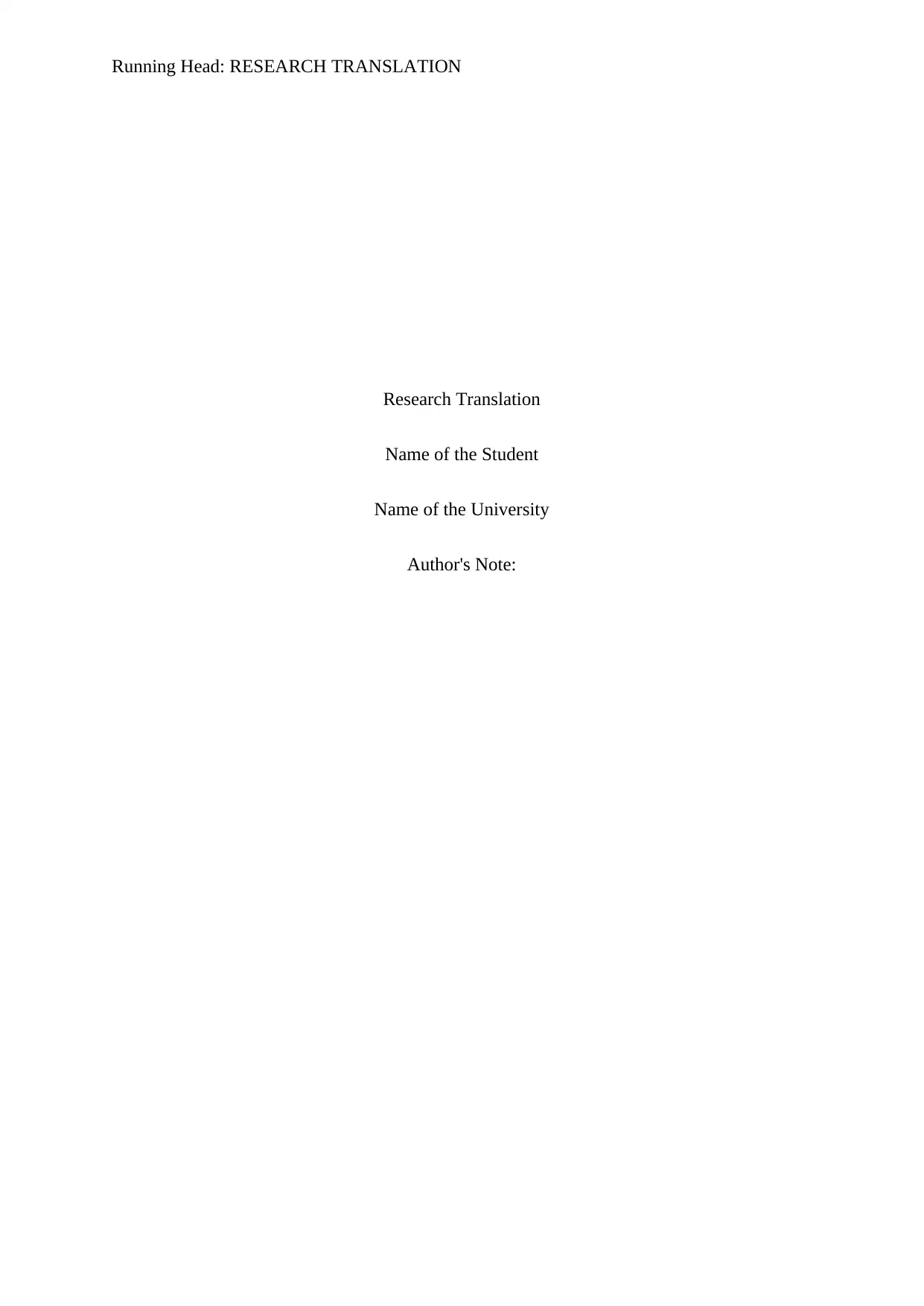
Running Head: RESEARCH TRANSLATION
Research Translation
Name of the Student
Name of the University
Author's Note:
Research Translation
Name of the Student
Name of the University
Author's Note:
Paraphrase This Document
Need a fresh take? Get an instant paraphrase of this document with our AI Paraphraser
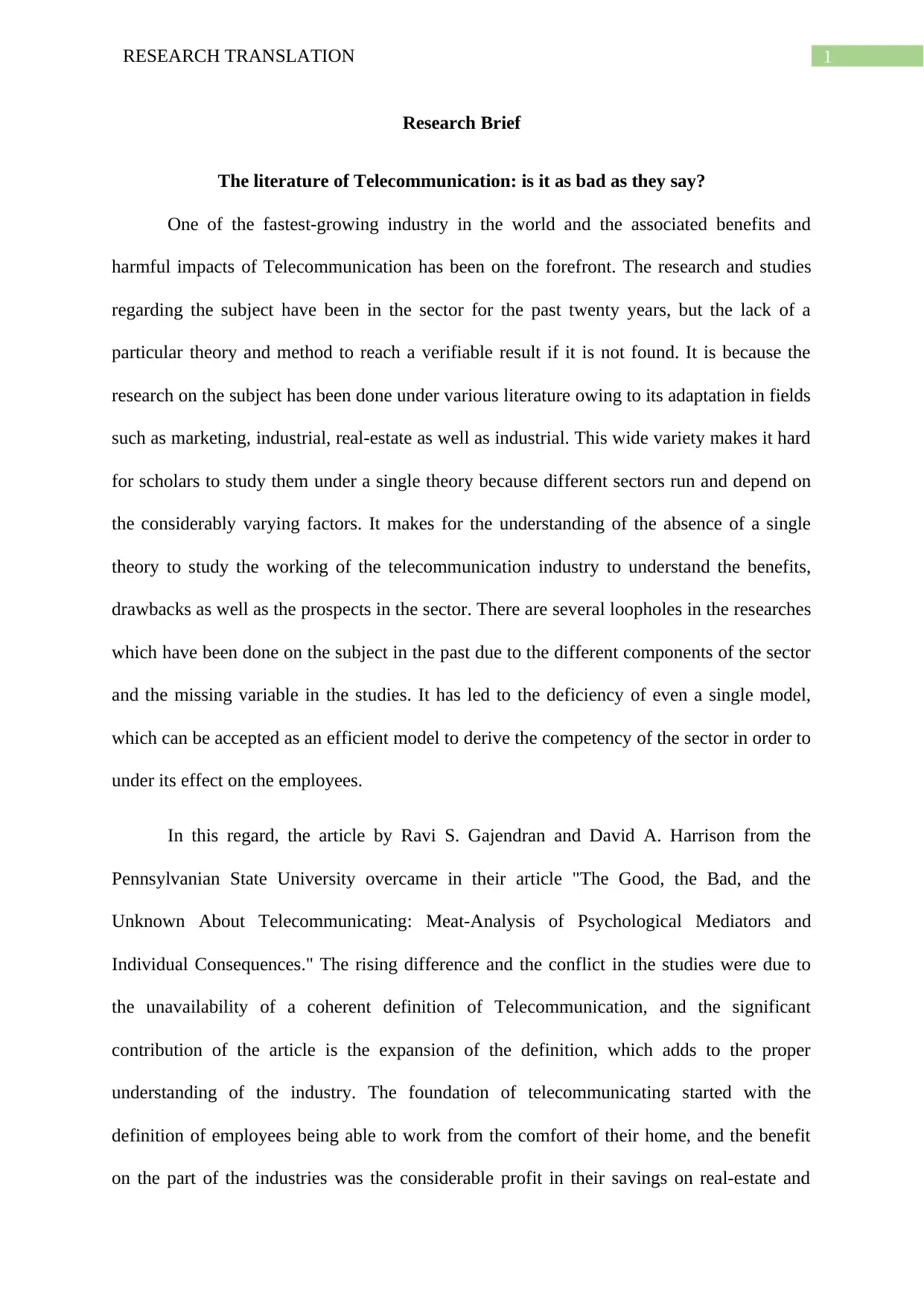
1RESEARCH TRANSLATION
Research Brief
The literature of Telecommunication: is it as bad as they say?
One of the fastest-growing industry in the world and the associated benefits and
harmful impacts of Telecommunication has been on the forefront. The research and studies
regarding the subject have been in the sector for the past twenty years, but the lack of a
particular theory and method to reach a verifiable result if it is not found. It is because the
research on the subject has been done under various literature owing to its adaptation in fields
such as marketing, industrial, real-estate as well as industrial. This wide variety makes it hard
for scholars to study them under a single theory because different sectors run and depend on
the considerably varying factors. It makes for the understanding of the absence of a single
theory to study the working of the telecommunication industry to understand the benefits,
drawbacks as well as the prospects in the sector. There are several loopholes in the researches
which have been done on the subject in the past due to the different components of the sector
and the missing variable in the studies. It has led to the deficiency of even a single model,
which can be accepted as an efficient model to derive the competency of the sector in order to
under its effect on the employees.
In this regard, the article by Ravi S. Gajendran and David A. Harrison from the
Pennsylvanian State University overcame in their article "The Good, the Bad, and the
Unknown About Telecommunicating: Meat-Analysis of Psychological Mediators and
Individual Consequences." The rising difference and the conflict in the studies were due to
the unavailability of a coherent definition of Telecommunication, and the significant
contribution of the article is the expansion of the definition, which adds to the proper
understanding of the industry. The foundation of telecommunicating started with the
definition of employees being able to work from the comfort of their home, and the benefit
on the part of the industries was the considerable profit in their savings on real-estate and
Research Brief
The literature of Telecommunication: is it as bad as they say?
One of the fastest-growing industry in the world and the associated benefits and
harmful impacts of Telecommunication has been on the forefront. The research and studies
regarding the subject have been in the sector for the past twenty years, but the lack of a
particular theory and method to reach a verifiable result if it is not found. It is because the
research on the subject has been done under various literature owing to its adaptation in fields
such as marketing, industrial, real-estate as well as industrial. This wide variety makes it hard
for scholars to study them under a single theory because different sectors run and depend on
the considerably varying factors. It makes for the understanding of the absence of a single
theory to study the working of the telecommunication industry to understand the benefits,
drawbacks as well as the prospects in the sector. There are several loopholes in the researches
which have been done on the subject in the past due to the different components of the sector
and the missing variable in the studies. It has led to the deficiency of even a single model,
which can be accepted as an efficient model to derive the competency of the sector in order to
under its effect on the employees.
In this regard, the article by Ravi S. Gajendran and David A. Harrison from the
Pennsylvanian State University overcame in their article "The Good, the Bad, and the
Unknown About Telecommunicating: Meat-Analysis of Psychological Mediators and
Individual Consequences." The rising difference and the conflict in the studies were due to
the unavailability of a coherent definition of Telecommunication, and the significant
contribution of the article is the expansion of the definition, which adds to the proper
understanding of the industry. The foundation of telecommunicating started with the
definition of employees being able to work from the comfort of their home, and the benefit
on the part of the industries was the considerable profit in their savings on real-estate and
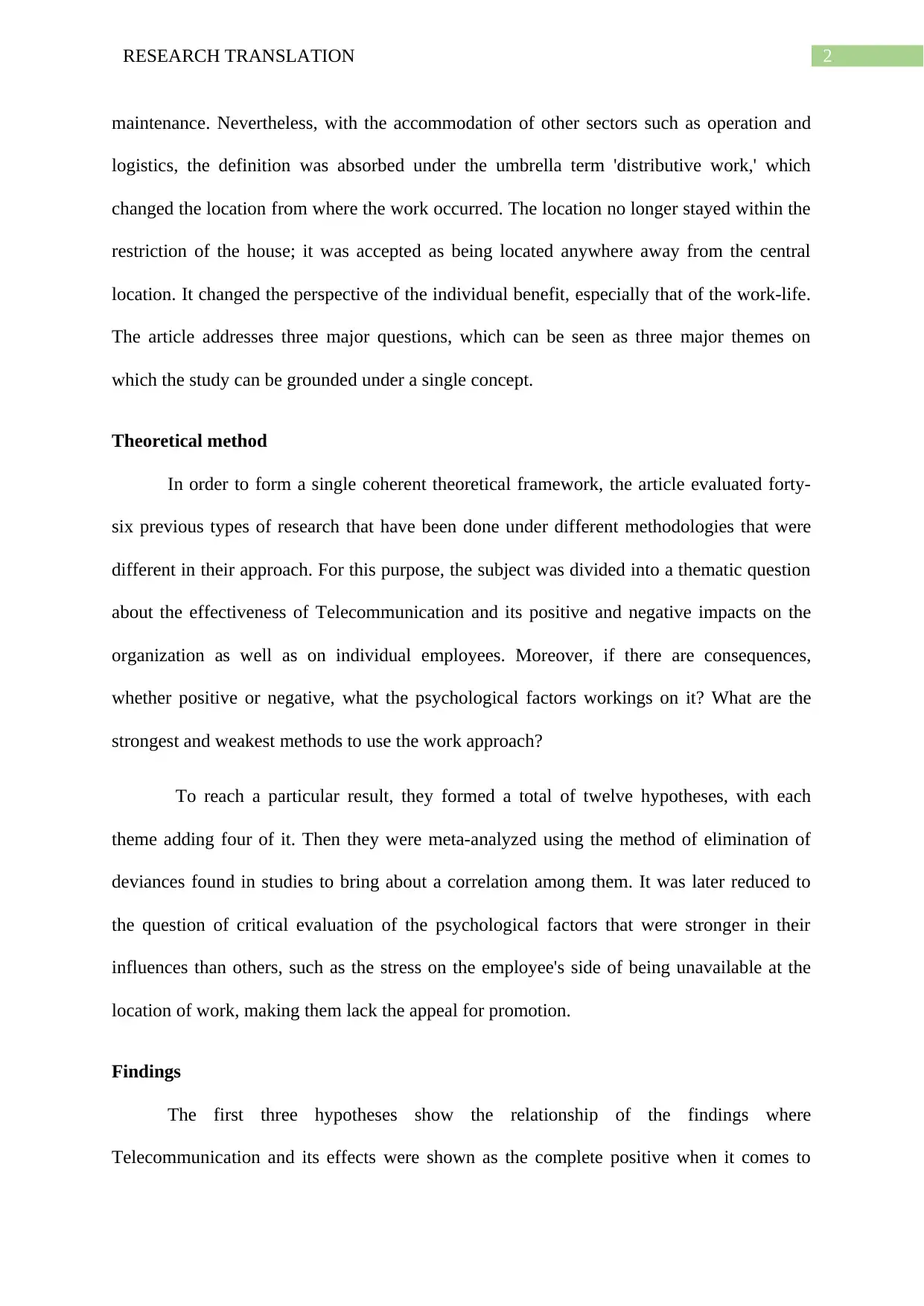
2RESEARCH TRANSLATION
maintenance. Nevertheless, with the accommodation of other sectors such as operation and
logistics, the definition was absorbed under the umbrella term 'distributive work,' which
changed the location from where the work occurred. The location no longer stayed within the
restriction of the house; it was accepted as being located anywhere away from the central
location. It changed the perspective of the individual benefit, especially that of the work-life.
The article addresses three major questions, which can be seen as three major themes on
which the study can be grounded under a single concept.
Theoretical method
In order to form a single coherent theoretical framework, the article evaluated forty-
six previous types of research that have been done under different methodologies that were
different in their approach. For this purpose, the subject was divided into a thematic question
about the effectiveness of Telecommunication and its positive and negative impacts on the
organization as well as on individual employees. Moreover, if there are consequences,
whether positive or negative, what the psychological factors workings on it? What are the
strongest and weakest methods to use the work approach?
To reach a particular result, they formed a total of twelve hypotheses, with each
theme adding four of it. Then they were meta-analyzed using the method of elimination of
deviances found in studies to bring about a correlation among them. It was later reduced to
the question of critical evaluation of the psychological factors that were stronger in their
influences than others, such as the stress on the employee's side of being unavailable at the
location of work, making them lack the appeal for promotion.
Findings
The first three hypotheses show the relationship of the findings where
Telecommunication and its effects were shown as the complete positive when it comes to
maintenance. Nevertheless, with the accommodation of other sectors such as operation and
logistics, the definition was absorbed under the umbrella term 'distributive work,' which
changed the location from where the work occurred. The location no longer stayed within the
restriction of the house; it was accepted as being located anywhere away from the central
location. It changed the perspective of the individual benefit, especially that of the work-life.
The article addresses three major questions, which can be seen as three major themes on
which the study can be grounded under a single concept.
Theoretical method
In order to form a single coherent theoretical framework, the article evaluated forty-
six previous types of research that have been done under different methodologies that were
different in their approach. For this purpose, the subject was divided into a thematic question
about the effectiveness of Telecommunication and its positive and negative impacts on the
organization as well as on individual employees. Moreover, if there are consequences,
whether positive or negative, what the psychological factors workings on it? What are the
strongest and weakest methods to use the work approach?
To reach a particular result, they formed a total of twelve hypotheses, with each
theme adding four of it. Then they were meta-analyzed using the method of elimination of
deviances found in studies to bring about a correlation among them. It was later reduced to
the question of critical evaluation of the psychological factors that were stronger in their
influences than others, such as the stress on the employee's side of being unavailable at the
location of work, making them lack the appeal for promotion.
Findings
The first three hypotheses show the relationship of the findings where
Telecommunication and its effects were shown as the complete positive when it comes to
⊘ This is a preview!⊘
Do you want full access?
Subscribe today to unlock all pages.

Trusted by 1+ million students worldwide
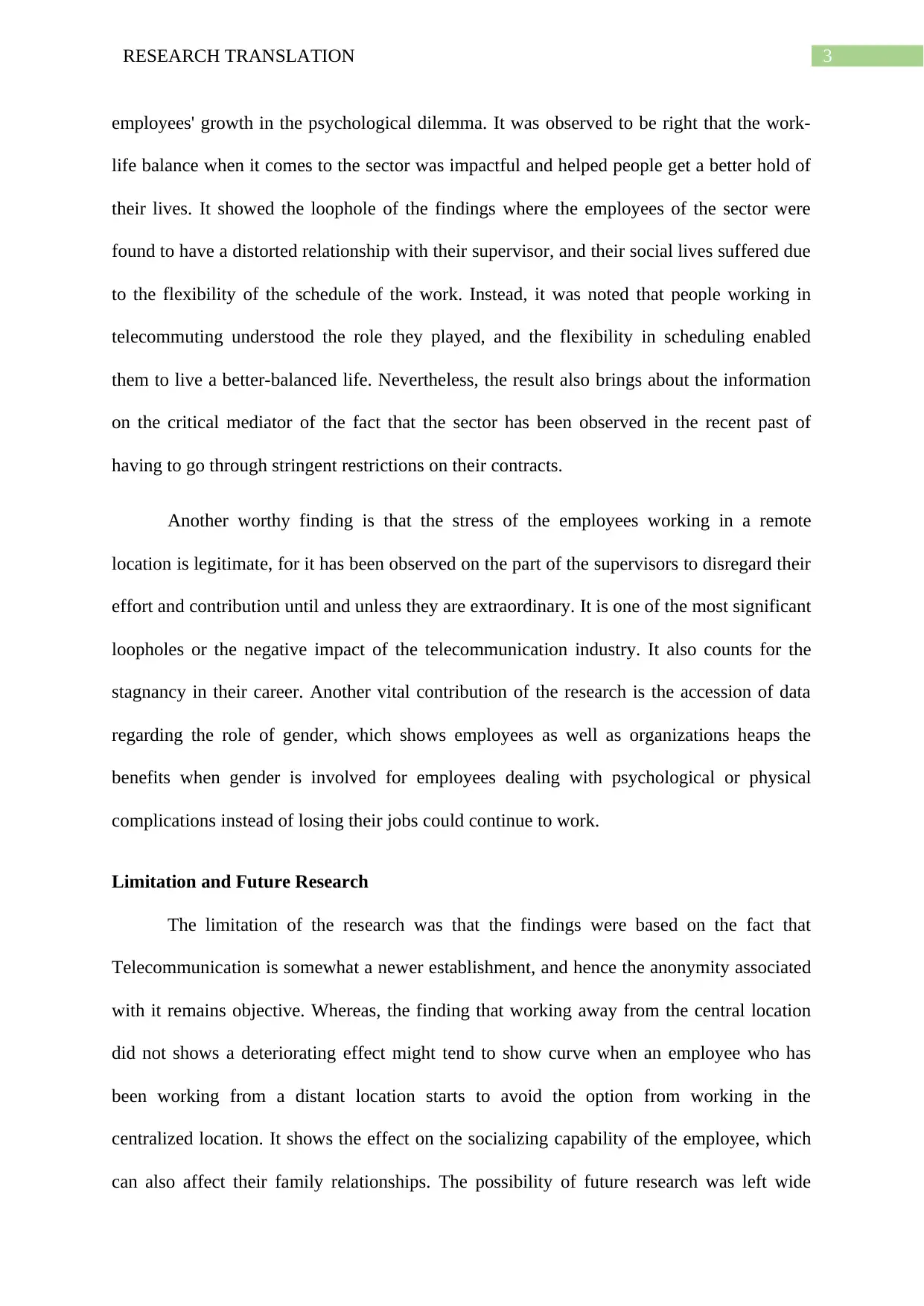
3RESEARCH TRANSLATION
employees' growth in the psychological dilemma. It was observed to be right that the work-
life balance when it comes to the sector was impactful and helped people get a better hold of
their lives. It showed the loophole of the findings where the employees of the sector were
found to have a distorted relationship with their supervisor, and their social lives suffered due
to the flexibility of the schedule of the work. Instead, it was noted that people working in
telecommuting understood the role they played, and the flexibility in scheduling enabled
them to live a better-balanced life. Nevertheless, the result also brings about the information
on the critical mediator of the fact that the sector has been observed in the recent past of
having to go through stringent restrictions on their contracts.
Another worthy finding is that the stress of the employees working in a remote
location is legitimate, for it has been observed on the part of the supervisors to disregard their
effort and contribution until and unless they are extraordinary. It is one of the most significant
loopholes or the negative impact of the telecommunication industry. It also counts for the
stagnancy in their career. Another vital contribution of the research is the accession of data
regarding the role of gender, which shows employees as well as organizations heaps the
benefits when gender is involved for employees dealing with psychological or physical
complications instead of losing their jobs could continue to work.
Limitation and Future Research
The limitation of the research was that the findings were based on the fact that
Telecommunication is somewhat a newer establishment, and hence the anonymity associated
with it remains objective. Whereas, the finding that working away from the central location
did not shows a deteriorating effect might tend to show curve when an employee who has
been working from a distant location starts to avoid the option from working in the
centralized location. It shows the effect on the socializing capability of the employee, which
can also affect their family relationships. The possibility of future research was left wide
employees' growth in the psychological dilemma. It was observed to be right that the work-
life balance when it comes to the sector was impactful and helped people get a better hold of
their lives. It showed the loophole of the findings where the employees of the sector were
found to have a distorted relationship with their supervisor, and their social lives suffered due
to the flexibility of the schedule of the work. Instead, it was noted that people working in
telecommuting understood the role they played, and the flexibility in scheduling enabled
them to live a better-balanced life. Nevertheless, the result also brings about the information
on the critical mediator of the fact that the sector has been observed in the recent past of
having to go through stringent restrictions on their contracts.
Another worthy finding is that the stress of the employees working in a remote
location is legitimate, for it has been observed on the part of the supervisors to disregard their
effort and contribution until and unless they are extraordinary. It is one of the most significant
loopholes or the negative impact of the telecommunication industry. It also counts for the
stagnancy in their career. Another vital contribution of the research is the accession of data
regarding the role of gender, which shows employees as well as organizations heaps the
benefits when gender is involved for employees dealing with psychological or physical
complications instead of losing their jobs could continue to work.
Limitation and Future Research
The limitation of the research was that the findings were based on the fact that
Telecommunication is somewhat a newer establishment, and hence the anonymity associated
with it remains objective. Whereas, the finding that working away from the central location
did not shows a deteriorating effect might tend to show curve when an employee who has
been working from a distant location starts to avoid the option from working in the
centralized location. It shows the effect on the socializing capability of the employee, which
can also affect their family relationships. The possibility of future research was left wide
Paraphrase This Document
Need a fresh take? Get an instant paraphrase of this document with our AI Paraphraser
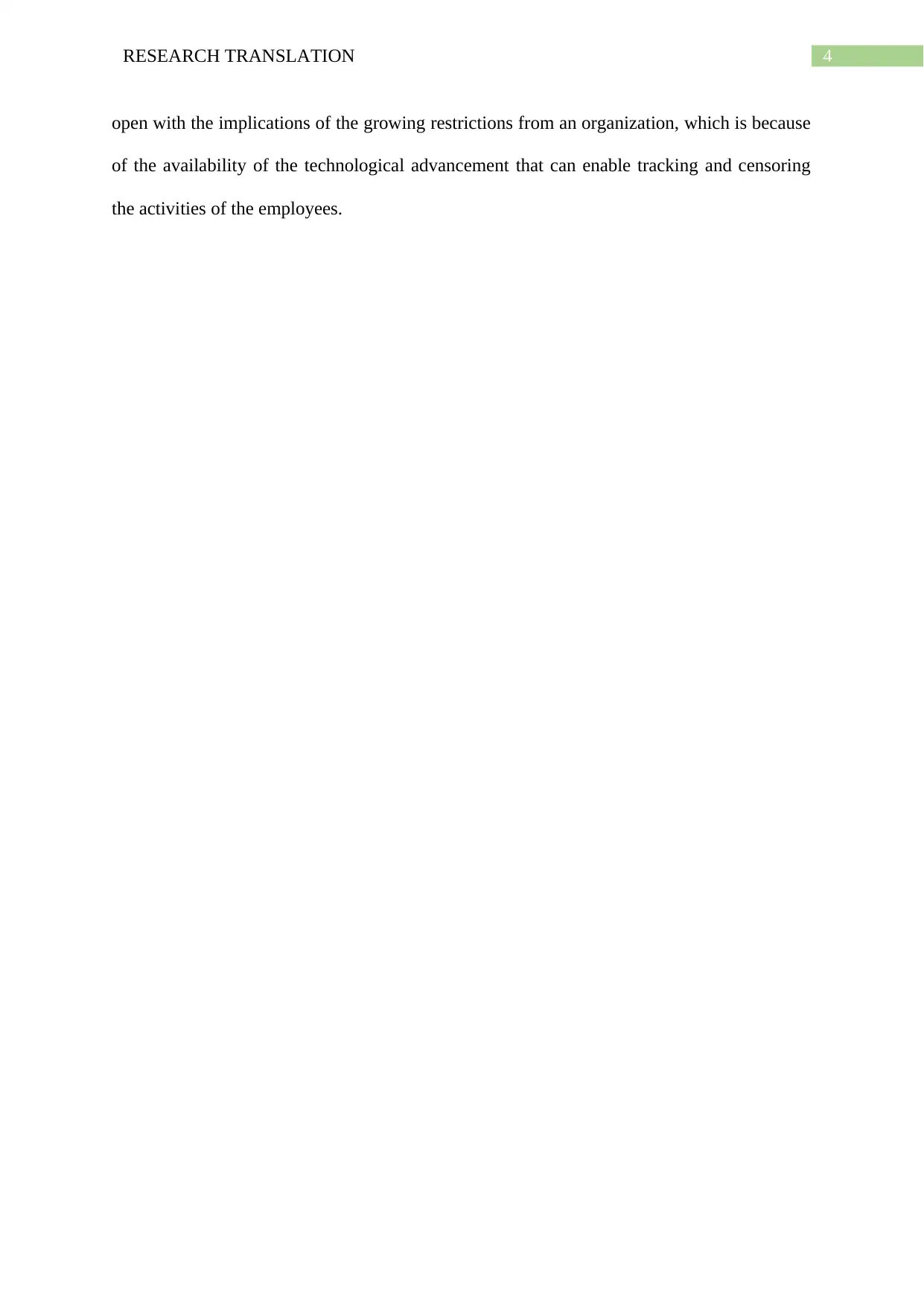
4RESEARCH TRANSLATION
open with the implications of the growing restrictions from an organization, which is because
of the availability of the technological advancement that can enable tracking and censoring
the activities of the employees.
open with the implications of the growing restrictions from an organization, which is because
of the availability of the technological advancement that can enable tracking and censoring
the activities of the employees.

5RESEARCH TRANSLATION
References
Gajendran, R. S., & Harrison, D. A. (2007). The good, the bad, and the unknown about
telecommuting: Meta-analysis of psychological mediators and individual
consequences. Journal of applied psychology, 92(6), 1524.
References
Gajendran, R. S., & Harrison, D. A. (2007). The good, the bad, and the unknown about
telecommuting: Meta-analysis of psychological mediators and individual
consequences. Journal of applied psychology, 92(6), 1524.
⊘ This is a preview!⊘
Do you want full access?
Subscribe today to unlock all pages.

Trusted by 1+ million students worldwide
1 out of 6
Related Documents
Your All-in-One AI-Powered Toolkit for Academic Success.
+13062052269
info@desklib.com
Available 24*7 on WhatsApp / Email
![[object Object]](/_next/static/media/star-bottom.7253800d.svg)
Unlock your academic potential
Copyright © 2020–2026 A2Z Services. All Rights Reserved. Developed and managed by ZUCOL.




